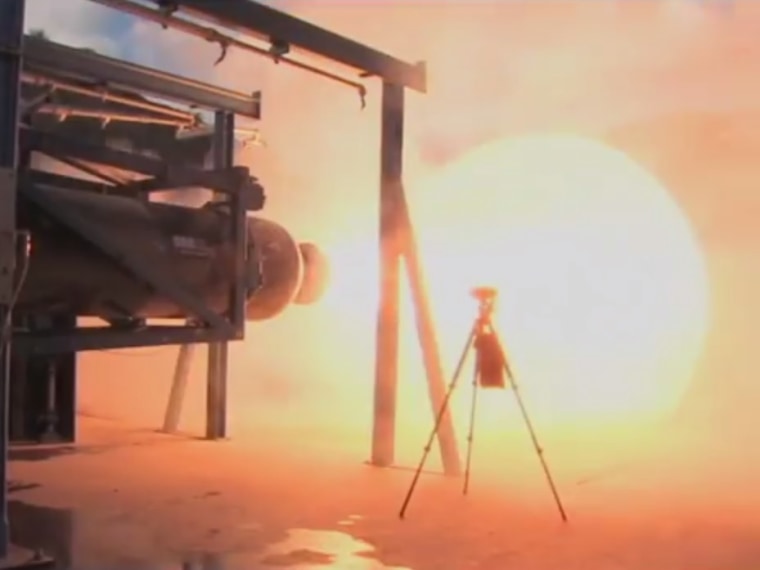Virgin Galactic had to postpone a rocket-powered test flight of its SpaceShipTwo craft last month, due to cloudy weather - but the space tourism company still managed to end the year with a blast.
The company’s end-of-the-year video, released on Monday, shows a full-duration firing of SpaceShipTwo’s hybrid rocket motor during a ground test. This was the first public airing of footage showing a 56-second burn, which is said to be long enough to send the rocket plane past the boundary of outer space.
Sierra Nevada Corp. developed the motor, which runs on rubber-based solid fuel and nitrous oxide.
SpaceShipTwo has gone through two powered flight tests so far at the Mojave Air and Space Port in California. Each test involves hooking the plane onto its WhiteKnightTwo carrier plane, bringing it up to an altitude of almost 50,000 feet, letting it drop and then firing up the engine for a supersonic ride.
The engine blazed for 20 seconds during SpaceShipTwo's most recent powered test in September, which went to a height of 69,000 feet (21 kilometers).
The strategy employed by Virgin Galactic and its partner for the test flights, Scaled Composites, calls for more ambitious test flights that eventually go beyond 100 kilometers (62 miles), the internationally accepted boundary of outer space. If all goes well, Virgin Galactic could begin commercial space tours later this year, with Virgin founder Richard Branson and his children taking their seats on the milestone flight.
Almost 700 customers, including celebrities such as Lady Gaga and Justin Bieber, have signed up for suborbital spaceflights. The current price tag for a ticket is $250,000.
More about Virgin Galactic:
- Virgin Galactic shows off its shine in gliding test
- Richard Branson: Buy your spaceflight with bitcoin
- NBC News archive on Virgin Galactic
NBCUniversal has established a multi-platform partnership with Virgin Galactic to track the development of SpaceShipTwo and televise its inaugural commercial spaceflight.
Alan Boyle is NBCNews.com's science editor. Connect with the Cosmic Log community by "liking" the NBC News Science Facebook page, following @b0yle on Twitter and adding +Alan Boyle to your Google+ circles. You can also check out "The Case for Pluto," my book about the controversial dwarf planet and the search for new worlds.
